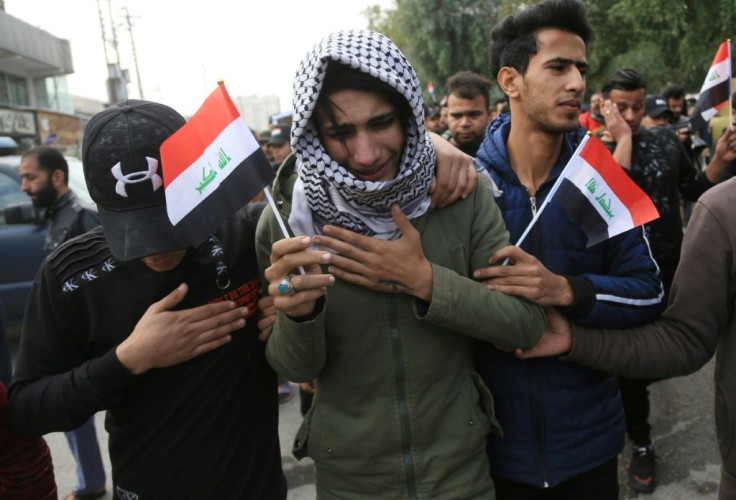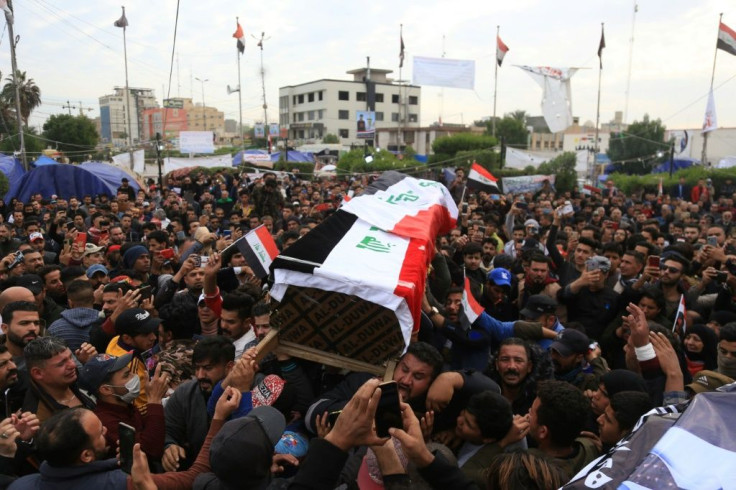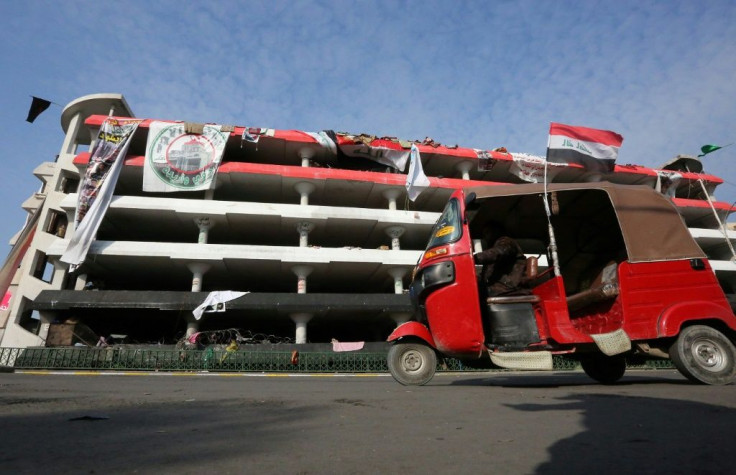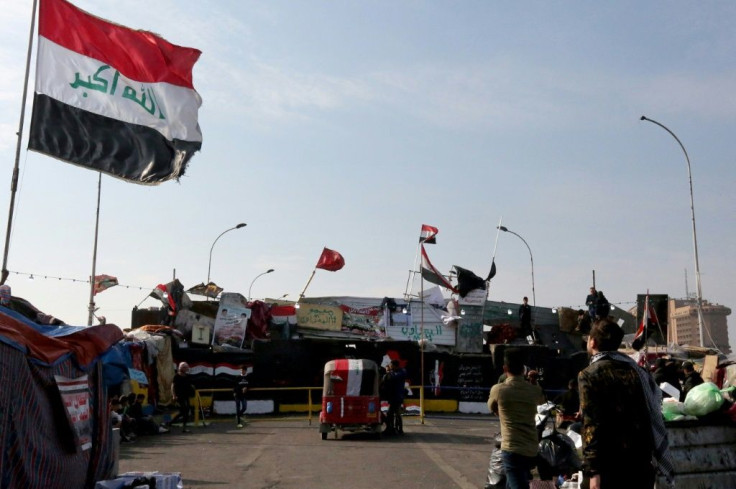Iraqis Rally Against Government As Baghdad Summons Western Envoys

Iraqis turned out Monday to mourn a prominent activist gunned down the previous evening, the latest violent episode in anti-government demonstrations in which more than 450 people have died.
That came as Iraq's foreign ministry summoned four Western envoys over their condemnation of a deadly attack against protesters at the weekend.
Iraq's capital and its Shiite-majority south have been gripped by more than two months of rallies against corruption, poor public services and a lack of jobs.
Prominent civil society activist Fahem al-Tai was killed in a drive-by shooting in Iraq's shrine city of Karbala late Sunday while returning home from protests.
Hundreds joined his funeral procession Monday, carrying 53-year-old Tai's coffin through the city's streets.
"We will not forget our martyrs," read one sign carried by tearful protesters.
The country is expected to see widespread protests on Tuesday, marking two years since Iraq defeated the Islamic State group jihadist group.
Activists have called for massive marches from other Iraqi cities towards Baghdad, but paramilitary leaders have warned such protests would be "ruinous."
"It will bring the most massive chaos yet to Baghdad," said Qais al-Khazali, the head of the prominent Asaib Ahl al-Haq armed faction, who was recently blacklisted by the US.

Asaib Ahl al-Haq is one of the most powerful groups in Iraq's Hashed al-Shaabi security force, a network of armed groups integrated into the state.
Hashed chief Faleh al-Fayyadh over the weekend ordered the factions to stay away from rallies.
Founded in 2014 to fight IS jihadists who had seized swathes of northern Iraq and neighbouring Syria, the Hashed is made up of mostly Shiite factions, many of which have been backed by Iran.

It initially backed the government over protests but switched sides, although protesters fear Hashed fighters' presence at rallies could derail their anti-regime movement.
Demonstrators are seeking a comeback after an attack on a major Baghdad protest site left 20 protesters and four police officers dead, sparking nationwide outrage.
The British, French and German ambassadors to Iraq condemned the violence in a meeting with caretaker premier Adel Abdel Mahdi, who resigned on December 1.
"No armed group should be able to operate outside of the control of the state," the envoys said in a statement, urging the government to "urgently investigate".
The envoys also pressed the government to implement its recent order that the Hashed "stay away from protest locations".

In response, Iraq's foreign ministry on Monday summoned all three ambassadors as well as their Canadian counterpart, who had similarly condemned the violence.
The ministry said their comments were an "unacceptable intervention in Iraq's internal affairs".
A diplomatic source told AFP the envoys were "not surprised" at having been summoned, particularly after the PM had defended his government in response to their criticism at the earlier meeting.
In addition to those killed, dozens of protesters went missing after the attack on the parking complex and have yet to resurface, their relatives told AFP.
Demonstrators have for weeks complained of being monitored, threatened and harassed in an intimidation campaign aimed at blunting their movement.
Since October 1, the youth-led rallies have accused the ruling class both of being inept and corrupt and of being heavily influenced by neighbouring Iran.
Baghdad has close ties with both Tehran and Iran's arch-foe Washington, which led the 2003 invasion that toppled Iraq's former dictator Saddam Hussein.
Some 5,200 US troops are still based across Iraq and are facing a spike in rocket attacks on their positions.
The latest in the early hours of Monday saw four rockets slam into an Iraqi base that hosts a small contingent of US forces next to Baghdad International Airport.
Six Iraqi troops were wounded, according to the military.
Security sources said they belong to the elite Counter-Terrorism Service, created and trained by US forces.
No American forces were wounded in the recent salvoes.
While there have been no claims of responsibility, US defence officials have blamed several of the attacks on Iran-backed factions in Iraq.
Tensions between Iran and the US have soared since last year, when Washington pulled out of a landmark nuclear agreement with Tehran and reimposed crippling sanctions.
Baghdad, worried about being caught in the middle of their bitter dispute, is also struggling with its own domestic political crisis.
President Barham Saleh has until December 17 to name a replacement premier, and political parties are deep in talks to agree on a consensus candidate.
© Copyright AFP 2024. All rights reserved.





















